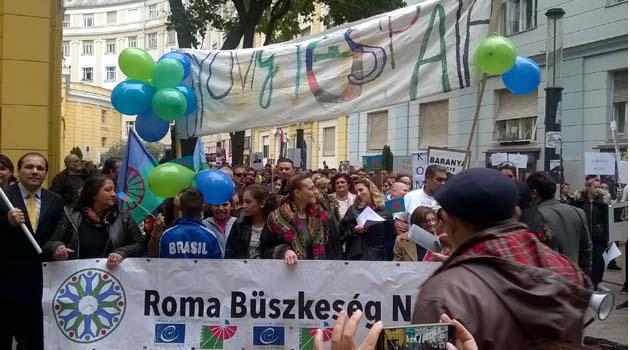Hungary: 1 000 fans of Roma Pride march through Budapest, honor Romani revolutionaries

The Roma Pride event took place yesterday for the fourth time in the Hungarian capital with an assembly and subsequent march attended by roughly 1 000 people. News server Origo.hu quoted educator Mónika Rózsa, a member of the Roma Club Foundation, which organizes the event, as saying Roma Pride Day is a public event where members of the Romani community espouse their identity and embrace each other.
Another organizer of the event, the Roma Press Center, designed a special-edition t-shirt this year depicting a Romani hero of the Hungarian revolutionary resistance of 1956, when a demonstration of solidarity with Poland grew into a spontaneous outpouring of Hungarian citizens against the Stalinist regime. The revolution was cruelly suppressed and more than 200 people died during harsh clashes with security forces.
This year’s march was dedicated to the memory of those who died in 1956. The motto this year was the slogan “Romani lives matter!”
The slogan responds in part to a recent order issued by the Hungarian Government as a result of which the segregation of Romani children persists in the schools. “[That system] seals the fate en masse of a generation of Romani adolescents and condemns them to abandoning efforts to secure employment, to failure on the labor market, or to performing public works jobs for the rest of their lives,” states a declaration by the Romani community network “We Belong Here!”.
The event was supported by many popular Romani music groups, such as Parno Graszt or EtnoRom, and featured speeches by local Romani elites such as Romani activist Marian Mandache, Romani actress Franciska Farkas, and the main organizer of Roma Pride, Jenő Setét. Several opposition politicians also attended.
Representatives of the Hungarian Liberal Party called for the current cabinet to immediately introduce measures to eliminate the segregation of Romani children in the schools. Politician Anet Bösz said at a press conference that the number of Romani children studying in classrooms where they are separated from non-Romani children has grown from 15 % in 2004 to 20 % today.
VIDEO